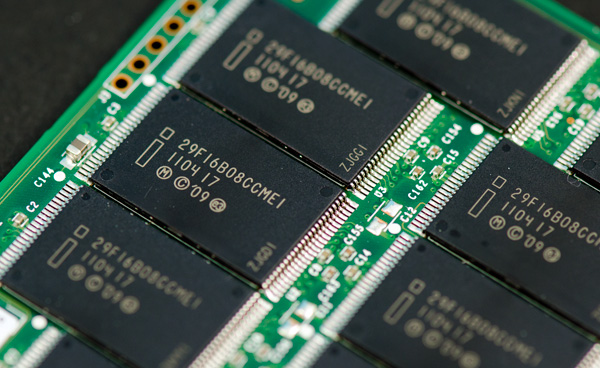The Intel SSD 320 Review: 25nm G3 is Finally Here
by Anand Lal Shimpi on March 28, 2011 11:08 AM EST- Posted in
- IT Computing
- Storage
- SSDs
- Intel
- Intel SSD 320
Final Words
Intel's SSD 320 would've been a great drive to have a year ago. Its performance is comparable to Micron's C300 or anything based on the SandForce SF-1200 controller, which last year was just awesome. If you've got a 3Gbps controller and need a drive today the 320 still isn't a bad option, particularly if Intel is promising even better reliability than the previous generation. The inclusion of full disk encryption is nice and it's something I hope all controller makers will embrace going forward as well. My biggest issue with the 320 is that it's not very forward looking.
Throw 2011 controllers into the mix, particularly the SF-2200 in the upcoming Vertex 3 and the 320 doesn't look all that great. The only way the 320 will make sense is if these next-generation drives ship at significantly higher price points. We also don't have a good idea of how much slower the smaller capacity drives perform in our benchmarks at this point.
I am curious to see how well a redesigned Postville controller would do against these newer drives. For an architecture that debuted in 2008, Intel's controller certainly has legs but it's time for something new - particularly if Intel isn't going to aggressively discount these mainstream drives.











194 Comments
View All Comments
Drag0nFire - Monday, March 28, 2011 - link
I have read with interest the comments in previous SSD articles. Actually, though, I am specifically interested in the longevity characteristics of this drive being discussed today. I was surprised to see no mention in the article.If the longevity of the Intel SSD 320 has been discussed previously, I apologize for wasting your time.
Anand Lal Shimpi - Monday, March 28, 2011 - link
The 320 (as well as Crucial's m4) arrived while I was away at CTIA last week - I got back Friday morning. That gave me a minimal amount of time to get everything tested before today's NDA. As a result, about five pages got cut out of the 320 review - one of them talked about write amp and exactly what you're asking for. Soon :)Take care,
Anand
Drag0nFire - Tuesday, March 29, 2011 - link
Thanks so much. You guys are the best!Mr Perfect - Monday, March 28, 2011 - link
I'm surprised no one has mentioned the Crucial M4 (AKA C400?) numbers in the benchmarks. Is this old news, or did they just slip in there without anyone noticing. :)Termie - Monday, March 28, 2011 - link
Intel is sending around $530 300GB drives to bench against the current crop of $200 120GB drives. As Anand rightly pointed out, the 300GB drive has completely different specs than the smaller drives. Unlike SandForce, which seems to provide similar performance across sizes, Intel's new drives cannot substitute for each other in performance.I'm guessing very few people will actually buy a $530 drive at this point (even $450 was a hard sell a year ago for the 160GB G2). There are just too many $200 alternatives, and these probably significantly outperform Intel's $200 G3.
crimson117 - Monday, March 28, 2011 - link
I wish the article was a little more clear about this - the first comparison mentioned is "Intel SSD 320 300GB vs. Corsair Force F120 [120GB]" and Anand immediately concludes that it proves the Intel Controller is faster.crimson117 - Monday, March 28, 2011 - link
Note Ryan's comment in another thread:"Both the 120GB Vertex 2 and 300GB i320 are fully populated - each has all of their NAND channels in use. Intel does have a lane count advantage (10 vs. 8), but that's a design difference rather than how the SSD is populated. Thus on an architectural level it's fair to compare the controllers, as we're looking at the performance of both when they're fully populated and the architecture is not unnecessarily bottlenecked.
"Now at equal capacities this wouldn't necessarily be the case. Intel did not provide us with a smaller SSD, which is why Anand said "We also don't have a good idea of how much slower the smaller capacity drives perform in our benchmarks at this point.". It's safe to assume a 120GB i320 won't be fully populated and that it will have lower performance as a result. How much? We don't know."
tonyn84 - Monday, March 28, 2011 - link
Man, I was waiting for these to come out before trying to pick up a larger drive but there's no cost benefit. The 256gb C300 is starting to look very good, going to keep an eye on those prices now.crimson117 - Monday, March 28, 2011 - link
Anand,"all indications pointed to it being faster than drives based on SandForce's SF-1200 controller. And it is..."
Is it really fair to put a 300GB Intel 320 drive against a 120GB SF-1200 drive and conclude the Intel's new controller is faster?
My understanding is that larger SSD's generally perform faster than smaller SSD's, particularly in Write operations, because they have more NAND to write across at once.
How would the 120GB model Intel 320 stand up to a Vertex 2 120GB, when it doesn't have the NAND chip quantity advantage?
Thanks,
crimson117
crimson117 - Monday, March 28, 2011 - link
EDIT: I just saw this on the final page."We also don't have a good idea of how much slower the smaller capacity drives perform in our benchmarks at this point."
That should be mentioned as a caveat on the first page's "Intel SSD 320 300GB vs. Corsair Force F120 [120GB]" comparison chart (if you even keep that chart at all). That chart really doesn't provide a useful comparison when you consider the size advantage of the Intel drive.